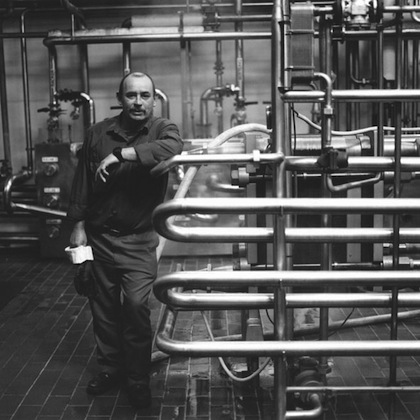The regional independents occupy the healthiest niche in the brewing industry today. While micros and brewpubs are folding almost as fast today as they popped up in the early and mid-1990′s, and while big commercial breweries scramble for gimmicks to boost flat sales, the regional independents continue to grow, though carefully.
Lots of people have tried—and failed—to break the dominance of the Australian Big Two.
Australia is a country marked by unfair stereotypes. Aussie beer drinkers are often seen as cowboys who spend their nights in dusty country bars, chugging giant cans of bland lager. Truth is, most Australians are city-dwellers, and the big “oil cans,” while still sold overseas, were abandoned in Australia decades ago.

What is true is that Australians do tend to prefer international-style lagers. Walk into a typical Australian beer store and you’ll find lots of brands—Victoria Bitter, Carlton Cold, Foster’s Ice, Toohey’s New, Swan Lager—but very little difference in taste.
True, in the US beer market, the big three brewers produce 80 percent of the beer, most of it in the international style. That still leaves 20 percent of the market available for over 1,000 small breweries to launch the American beer revolution.
But the Australian picture is extreme: just two mega-brewers, Foster’s and Lion Nathan, produce nearly 95 percent of all beers sold.
In the past five years, a rising number of independent brewers—both Australians and a surprising number of expatriate Americans—are struggling to make Australia’s beers more interesting. These little brewers face formidable obstacles but they are slowly introducing Australians to the global beer revolution.
Nine decades of consolidation
Australians have been consolidating breweries ever since six Melbourne breweries joined forces in 1907 to form Carlton and United Breweries, or CUB. One of the six breweries was Foster’s. Over the past two decades, Foster’s Brewing has used Foster’s as its international brand name while calling its Australian division CUB.
In 1983, Foster’s was taken over by Elders IXL, a farm equipment manufacturer. Under Elders’ control, the firm went on a global buying spree, purchasing Courage in Britain in 1986 and Carling O’Keefe in Canada in 1987. (When Molson merged with Carling O’Keefe, the deal gave Foster’s control of 50 percent of Molson.) The company grew to be the world’s fourth largest brewer, and Foster’s chairman boasted that he would “Fosterize” the world. But the stock market crash of 1987 left Foster’s overextended and bleeding red ink. By the time Ted Kunkel became Foster’s CEO in 1992, the company’s future was in doubt.
It’s fair to say that the company had hit desperate times,” Kunkel told The Bulletin (an Australian news magazine) recently. “We were fighting for our very survival. With the debt load we had, we virtually had to ask our shareholders to save us.”
Under Kunkel’s leadership, Foster’s split off from Elders and issued new shares to help pay off its debt. It also sold several foreign subsidiaries, earning A$2.2 billion (US $1.6 billion) from its sale of Courage to Scottish and Newcastle and A$1.1 billion (US $750 million) from selling Molson the 50 percent of its stock that it owned. The result is that, under Kunkel’s leadership, Foster’s stock price has tripled and its debt has been sharply reduced.
Australia’s second big brewer didn’t come into existence until 1985, when financier Alan Bond, who already owned the Western Australian Swan Breweries, purchased Castlemaine Toohey Breweries (which owned breweries in Queensland and New South Wales).
The stock market crash of 1987 put an end to Bond’s brewing ambitions. His personal financial collapse left his breweries alive but suffocating from debt. In 1990, he sold his properties to the New Zealand firm of Lion Nathan, whose best-known brand is Steinlager. In 1998, Kirin purchased 45 percent of Lion Nathan.
Both Lion Nathan and Foster’s have been buying steadily in the 1990s. Lion Nathan’s purchases in this decade have included South Australian Breweries, a well-established regional brewery, and Hahn Breweries, a Sydney-based firm started by an expatriate American. Foster’s has purchased both Tasmania’s Cascade Brewery and the Northern Territories’ Darwin Brewery.
Foster’s and Lion Nathan have tried to keep some distance from these recent acquisitions, much in the same way that Miller keeps Leinenkugel as a distinct division. This ensures variety in the Australian premium beer market. Cascade products tend to be hoppier and more assertive than other CUB products; South Australian Breweries produces a stout that the Beverage Testing Institute names as one of the 10 best imports of 1999. And Michael Jackson praises two other Lion Nathan products: Hahn Premium and Toohey’s Old Black Ale.
In 1999, Foster’s controls 56 percent of the Australian market (up from 48 percent a decade ago), while Lion Nathan has 38 percent. Two surviving Australian independent regional brewers—Coopers in Adelaide and J. Boag and Son in Tasmania—each control 2 percent, leaving the remaining 2 percent for smaller brewers and imports.











